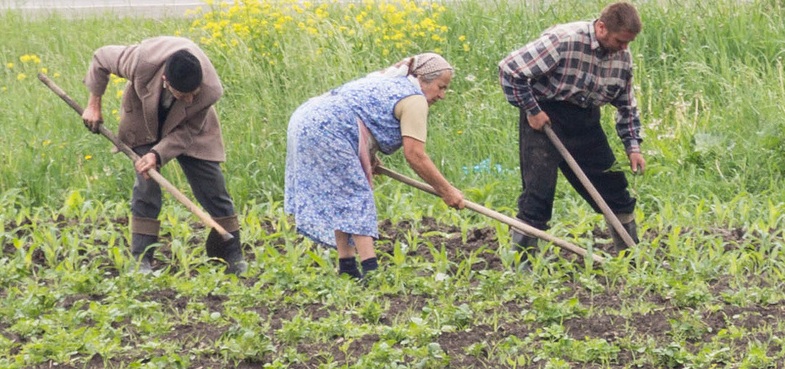Rising Temperatures Cut Economic Output
A new study shows that increasing heat will affect the health and productivity of workers in Europe as well as in the world’s hottest regions. Farm laborers toil in a field in Ukraine. (Brian Woychuk / Flickr)
Farm laborers toil in a field in Ukraine. (Brian Woychuk / Flickr)
This piece originally appeared on Climate News Network.
We are hot, we are tired, and we work less. Rising temperatures caused by climate change not only threaten to destroy many of the world’s ecosystems on which animal and human life depend, but heat increases in the workplace will also lead to a significant drop in economic productivity.
Ongoing studies into the impact of rising temperatures on various economic sectors suggest that the productivity reduction could be up to 25% in some cases.
Professor Lars Nybo, deputy head of the Department of Sport and Nutrition at the University of Copenhagen in Denmark, is leading a European Union research project called Heat-Shield.
The project is examining the way increases in temperature will affect the health and productivity of workers in agriculture, transport, construction, manufacturing and tourism across Europe.
Green aspect
“When we talk about climate change, the focus is often on the “green” aspect of what will happen in future,” Nybo says in the online ScienceNordic journal.
“But if you want politicians and others with influence to do something about the problem of rising temperatures, you also need to understand its economic aspects.
“This is what our research focuses on, and our initial results show that climate change could cost up to 25% of the productivity of some companies.”
Economic productivity will drop not only in parts of the world already experiencing extreme heat – such as southern Europe, the Middle East and the southern states of the US – but also in countries and companies in northern Europe, which could see big drops in economic output.
Not surprisingly, results from Heat-Shield studies show the sectors hardest hit by rising temperatures will be those that involve outdoor manual work, as well as indoor work where there is little or no access to air conditioning.
“In the EU, these kinds of companies make up to 40% to 50% of both the workforce and gross domestic product,” Nybo says.
“If productivity in these sectors falls by five per cent it will have a big impact.”
Recent results from time-motion studies looking at agriculture in Cyprus showed that the working hours of labourers in the sector dropped by 25% when temperatures reached 35ºC when compared to temperatures of 25ºC or less. Increasing temperatures also led to more work-related accidents.
Nybo says that previous estimates suggesting that rising global temperatures will result in declines in overall global productivity of between one and two per cent were too conservative.
Sustainable solutions
“It’s paradoxical when, for example, Donald Trump says that it’s too expensive to do something about climate change, when we see that it’s going to be too expensive if we don’t face the problems,” Nybo says.
“Switching to greener, sustainable solutions may require an investment, but there are clear, economic incentives in the long run.”
Rising temperatures have been blamed for an increase in mortality rates among foreign workers involved in construction projects in the Gulf state of Qatar.
A 2016 study by scientists at Germany’s Max Planck Institute concluded that across much of the Middle East and North Africa levels of intense heat will make any outdoor work virtually impossible by mid-century.
Your support matters…Independent journalism is under threat and overshadowed by heavily funded mainstream media.
You can help level the playing field. Become a member.
Your tax-deductible contribution keeps us digging beneath the headlines to give you thought-provoking, investigative reporting and analysis that unearths what's really happening- without compromise.
Give today to support our courageous, independent journalists.






You need to be a supporter to comment.
There are currently no responses to this article.
Be the first to respond.